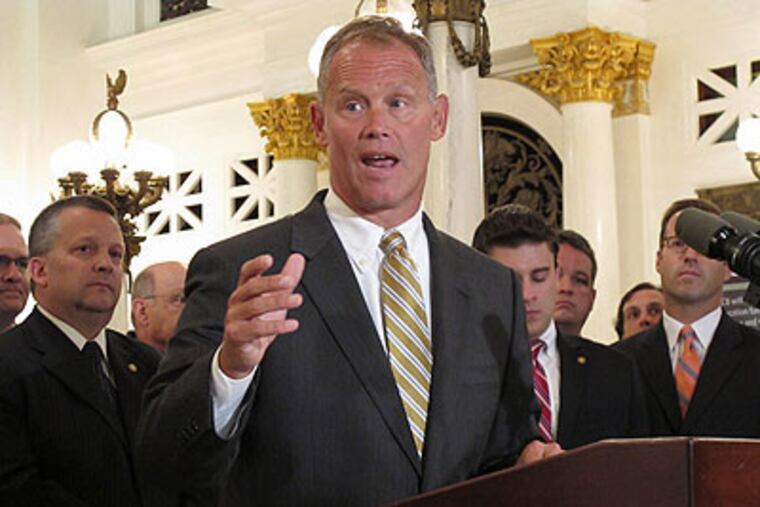DN Editorial: Harrisburg dickers over liquor privatization
THERE ARE many compelling arguments for ending the state monopoly on liquor sales and privatizing the business. House Majority Leader Mike Turzai's proposal that revised a privatization plan last year added at least 629 new reasons: His bill, unveiled Wednesday, doubled the number of licenses that would be auctioned off.

THERE ARE many compelling arguments for ending the state monopoly on liquor sales and privatizing the business.
House Majority Leader Mike Turzai's proposal that revised a privatization plan last year added at least 629 new reasons: His bill, unveiled Wednesday, doubled the number of licenses that would be auctioned off.
That addresses our concerns that the limited number of licenses would have to be priced so high that the number of liquor outlets would be kept artificially low in order for those new licensees to make their investment back. That could replace a state monopoly with a private-sector monopoly.
One of the arguments that lawmakers and Gov. Corbett have made in favor of privatization has been to give consumers more choice.
So the doubling of the number of licenses offered will go far to ensure that wider choice. That's not to say there aren't drawbacks to the plan. For one thing, the state's unemployment rate would be affected when the 5,000 state workers who staff the state liquor operations would lose their jobs.
Turzai's proposal would give tax credits to those stores hiring these workers, as well as provide tuition assistance if those laid off want to train for a new career.
It's hard to know how many more or fewer workers a private system of stores would produce, but it's probable that the salaries for private retail workers would be lower than the commonwealth's.
A new red flag was also raised in a report that found increased alcohol consumption in states that privatize liquor sales. The rationale: increased advertising and more ease in buying will contribute to a spike in alcohol sales, especially among heavy drinkers. These concerns are worth consideration.
But it's hard to view the Liquor Control Board's performance and not assume that the private sector can do it better.
And we're not just talking about the disastrous wine kiosks that the LCB installed in some retail locations in the hopes of "modernizing," but ended up being a cartoon version of the modern age, all but requiring notarized documents and a papal dispensation to buy a bottle of wine.
Even more troubling: Turzai's revelation that the LCB is not the font of huge profits that get plowed back into the state, and that those profits they do send are dangerously inflated. For example, in fiscal year 2009-10, the LCB sent $105 million in "profits" to the state, but in fact made only about $50 million from the sale of wine and spirits; the rest was pulled from its operational accounts. Turzai claims that since 2006-07, the LCB transferred $155 million more than it made from liquor sales. This kind of accounting is not only disturbing, but sounds unethical, to say nothing of illegal.
Reducing the size of government has become a mantra for many, including. Corbett, and it's hard to find a rationale for the state to be in the business of selling liquor, especially since it also has the job of enforcing liquor laws.
Still, as far as we can see, there is no clear agenda for how the state would use the $2 billion it anticipates from the sale of licenses. The governor favors funding transportation; Turzai wants the money to help alleviate the state's pension obligations. All these questions shouldn't stop the proposal, but they do demand time for a full airing. Like a good drink, the value of this idea will ultimately be in the mix of ingredients. *